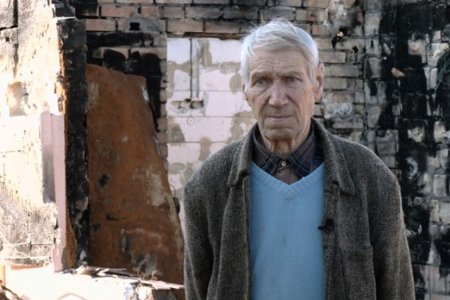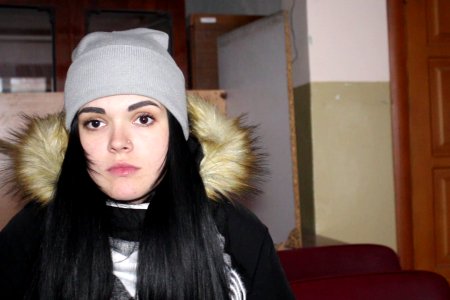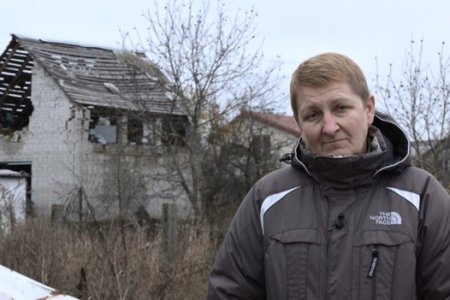I am Tamara Shehin, a member and volunteer of the Red Cross of Ukraine from 2003 to 2021. I came from the heroic city of Izium, Kharkiv region. I was in occupation for almost four months and miraculously survived.
— How did the war of 2022 come into your life?
— At about eight in the morning, the grandson, who is studying in Kharkiv, called us: “Mom, grandmother, the war has begun.” We haven’t turned on the TV yet. We didn’t believe it. But we heard the sad news when we turned the TV on. The 21st century is out there, but the Moscow medieval way of thinking persists. It was horrifying.
We listened to the news and prayed to God to drive evil spirits out of our land. We hoped that our strong army would push the enemy back. Until the 3 March, we were still hoping, but when they began to bomb the city around the clock, we realized the seriousness of this. We live in the Upper Village (as we call this area), and the city is below.
We saw on the Internet that they blew up one store, then another. When they hit the city center, we moved to the basement and spent the night in fear.
In the morning, my son-in-law got a call from his godfather, who came to pick up his sick father. He said he could take three people out by car. I told my daughter, son-in-law, grandson, and his girlfriend: “Get into the car, but I’m staying. Whatever will be, will be. I will pray to God.” They left for Borovaya. They called me from there when there were still phone connections: “Mom, we will come for you.”
And then such shelling began ... They bombed not only from the aircraft but also rocket launchers. We were encircled. There were three or four circles on all sides. So I said to them: “No, don’t risk it, come what may, I’m staying here.” They left and spent a little time in Borovaya with a relative. Then they drove towards the Donbas, and the volunteers took them to Lviv. I stayed in Izium for four months.
— Where were you during the shelling?
— All the time in the basement. The basement is low, under the slabs; we hoped we would survive because two or three houses in the city were destroyed, burying people underneath. About 50-60 people died. For a month, they tried to get to them but could not. All died.
We tried to survive. We brought food from the apartments. The men made the stove, and we cooked something hot every day.
We went to friends for water because the water lines were broken. We chopped firewood and tried to go on. The guys chopped wood, and others cooked. I prayed to God all the time. We supported each other.
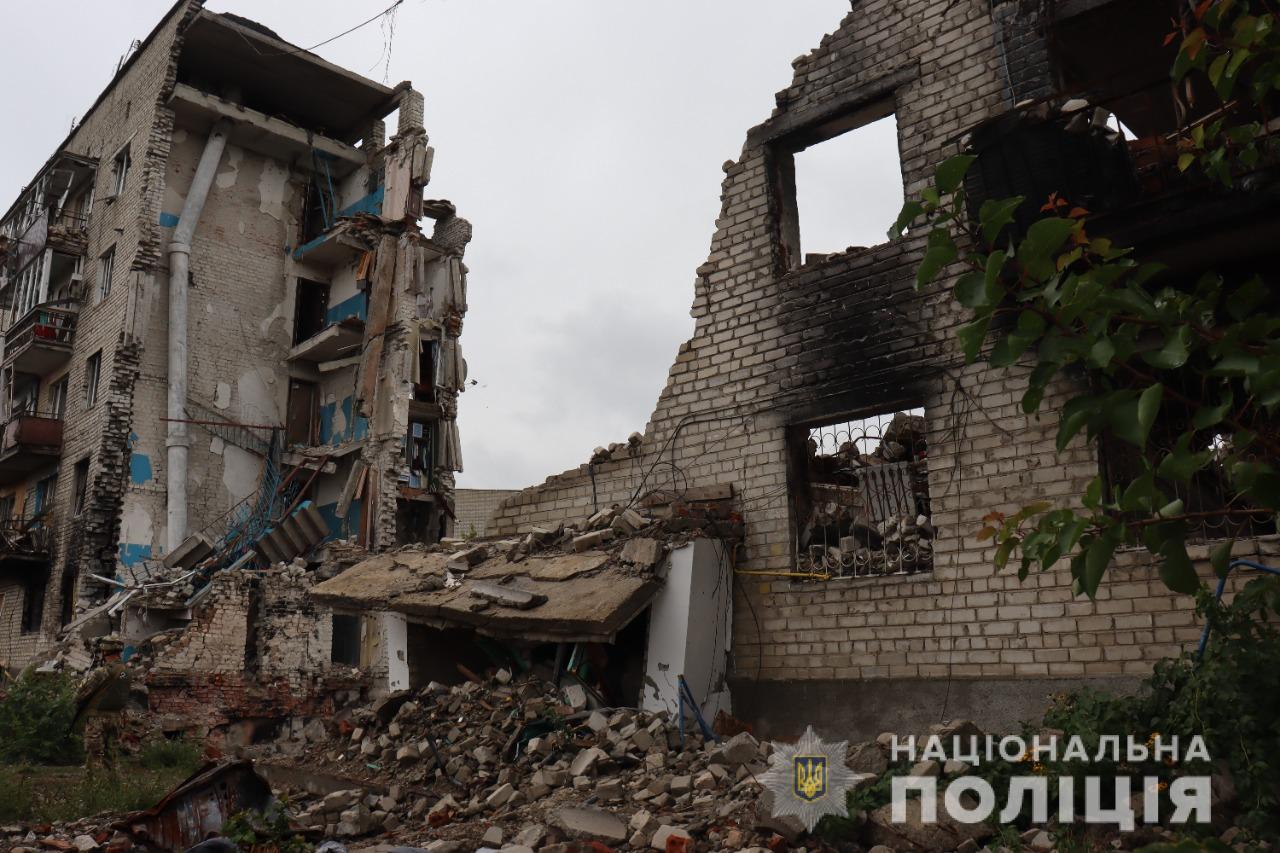
— How bad was the humanitarian situation in the city?
— I’m ashamed to say this, but a week later, the Muscovite soldiers began to bring us water and something to eat. They brought cookies from warehouses that had been seized. The guys who brought us food were more or less adequate. They even apologized to some of us: “We didn’t know! We were going to the military exercises, we are students, and we didn’t know.”
— Have you witnessed civilian casualties?
— A car was shot at. They traveled with a small child and did not stop at the checkpoint. They wanted to slip across the bridge onto the highway and were shot. Only the driver survived. He was wounded. The woman and child were killed. Another woman and her husband tried to slip through like that. They were also shot and hung from lanterns on the bridge. This was seen by people who lived near the market.
There were a lot of cluster shells. When they broke, nails, iron, and metal rounds flew in all directions bringing death or injury. Unfortunately, there were such cases in our building.
A woman’s daughter and son-in-law were hurt in such a way. They were sent to Kupiansk, which was also captured. There were many wounded: people were walking along the street, and cluster shells were flying. Many in our district died of heart failure or starvation. Many houses were destroyed. They were shooting from all sides, and we could not even understand what was happening because there were no sirens.
Guard stood at schools and kindergartens. We have Mount Kremenets, which went back and forth between two sides five or six times during World War II because it is tall. They were shooting from all sides: cluster shells, or, as they used to be called, Katyushas, rocket launchers. Helicopters and planes were flying, and drones were constantly flying over us. As I said, we were surrounded. It was in March. The bridges were blown up, and you couldn’t get into the city and out anywhere. It was impossible to get out of this circle. Finally, on 15 April, a bus with soldiers arrived. They said whoever wants, who has relatives in Muscovy — leave. They went from house to house, encouraging people to leave for Russia.
Sick, disabled, pensioners — you will have all the benefits there. We were standing and nodding. I said to myself: “If I die, then only in my homeland.” My answer was: “No.”
And we held out until the 19th. The shelling was continuous, houses were broken, and people were wounded. Finally, a cluster shell exploded near our basement, very close. We thought the building was collapsing and falling on us. When it calmed down, I was the first to rush outside.
We looked and saw in the grass a deep funnel two meters in diameter; the grass had been clipped. Everyone got scared, and my teeth were chattering until midnight.
They destroyed everything and burned our forests. The reservoirs were devastated, the fish disappeared, and there was no water. Not far from Izium, there is a water canal with a pump station, and everything is mined there. The entire infrastructure was destroyed. Schools and even churches that belonged to the Moscow Patriarchate were also wrecked.
— How was your evacuation?
— My daughter found volunteers to take us out. I was terrified. Before that, I kept up somehow, despite health problems. But then I decided: I can’t do it anymore. If I stay here, I won’t survive. So we were taken out through the Pecheneh reservoir and fields. The guys took risks. We were driving, and they were shooting at us. But somehow, we got to the Pecheneh. Then Kharkiv volunteers quickly took us through the reservoir to the bus to Kharkiv.
I called my daughter from Kharkiv because there were no phone connections before. We only had connections before Easter. We have a hill on the outskirts of the village from where people got in touch and told their relatives what happened in Izyum. Then the Russians began to jam communications so that people would not tell what was happening here. It was terrible. And how many people with small children died? For what? But they don’t have enough. They can’t put things in order in Muscovy, but they want to grab our land. It is horrifying.
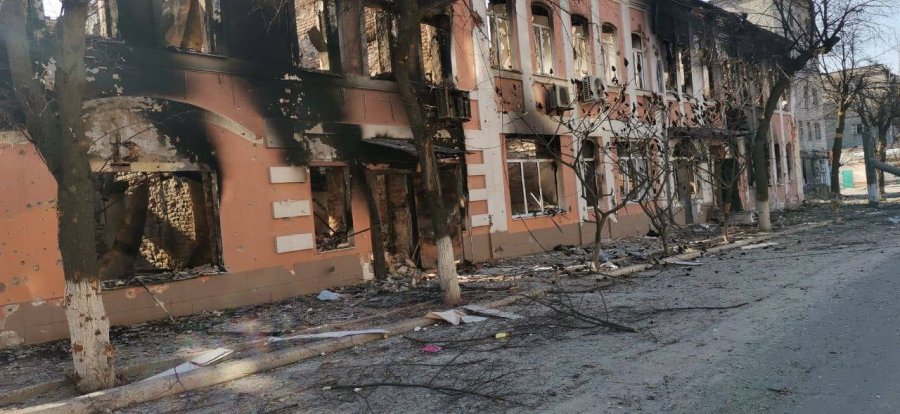
— Did the occupiers torment the people in Izium?
— My neighbor in a high-rise building is a farmer. He raised pigs. They came to him and said: “Come on, slaughter 3-4 pigs for us”. He replied: “No, take it yourself.” So they tortured him: they threw him into a pit, shot over his head, and beat him hard. I met him a month later, and he was very skinny. I asked: “Pasha, what is the matter with you?” He said, “Oh, you better not ask.” He told me he was beaten and threatened.
In the city, men were bullied, undressed on the street, and checked for marks from rifle butts.
There were not only Russians. We saw the Kadyrovites [Chechen fighters], and one person warned us to be careful. Not a word anywhere. There were soldiers from Turkmenistan or Tajikistan. The speech was not the same as that of Caucasians. They came and gave us canned goods. So there were many nationalities here. Buryats walked around, looking for booze and girls. That’s how they fought.
People told them: “Why did you come here?” And they: “We do not understand [Russian].”They did not understand Ukrainian either. “Have we invited you here? We lived in peace and friendship. We have many nationalities here.” — “We didn’t think it would be so beautiful here. We thought you lived in huts.” — So one guy said.
— Do you plan to return home after the end of the war?
— Our house, thank God, survived. The windows were shattered, but that’s minor. The main thing is that the house survived. Let’s hope for the victory of our army over these scums. Let them return to their Muscovy and shoot at their Kremlin, their people, and their children. There was a lot of their equipment in the village of Kapitolivka. They told our people to say that the Armed Forces of Ukraine are killing the population, promising to pay a million rubles for it. But our people disagreed!

